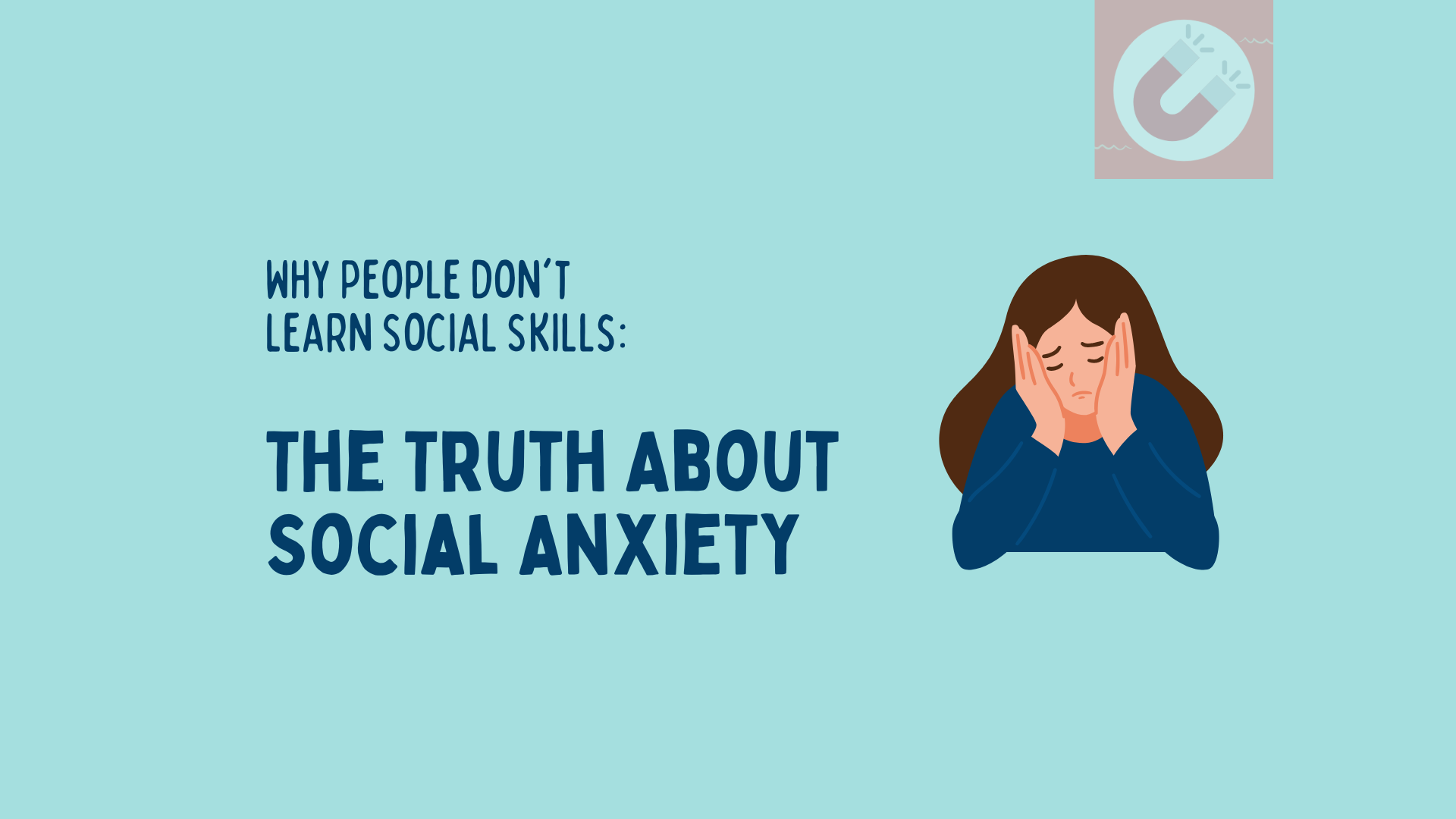Most people would like to have better social skills.
After all, socializing is a big part of life.
Unfortunately, many adults struggle with meeting new people. They never learn how to socialize properly because of social anxiety, autism, or lack of exposure to proper social skills. Different personalities or personality disorders cause people to feel anxious and uncomfortable in social situations.
In this blog post, we will explore the truth about social anxiety and why people don’t learn social skills. We will also provide tips on how you can meet new people and improve your social skills!
It can be hard to learn social skills in the real world. You might feel shy or embarrassed, and there’s a lot of pressure to get it right. People with social anxiety or ASD often find it hard to read social situations, make friends, date, or even hold a conversation.
What causes poor social skills or lack of social skills?
Social anxiety is one of the main reasons why people don’t learn social skills. Social anxiety is a fear of social situations that can cause physical symptoms like sweating, racing heart, and dizziness. The biggest one we hear of is someone’s mind going blank!
People with social anxiety often avoid social situations altogether. As a result, they never get the opportunity to practice and improve social skills as an adult.
What causes social anxiety?
Social anxiety comes from fear of rejection. It is usually based on the belief that you will be judged, humiliated, or rejected in social situations. This belief is often irrational and unfounded, but it can feel very real to the person with social anxiety. People with social anxiety often worry for days or weeks before a social event. They might even avoid going to events altogether, or may be reluctant to text people or stay in touch because of their fear.
Being rejected hurts because it feels like a reflection of our worth as a person. No one likes to be rejected, but social anxiety can make the fear of rejection much worse. People with social anxiety might believe that they will be rejected even before they enter a social situation. This belief can cause them to avoid social situations altogether, which only reinforces their fear.
Social anxiety is connected to the neuroticism, extroversion, and agreeableness personality traits. People who are high in neuroticism tend to be more anxious, sensitive, and prone to negative emotions. They also have a higher risk of developing social anxiety disorder.
The part of your brain that triggers social anxiety is the amygdala. The amygdala is responsible for your “fight or flight” response. In people with social anxiety, the amygdala is more active and reacts more strongly to social situations. This may create the feeling of self consciousness.
How To Be Social And Overcome Social Anxiety?
If you want to overcome social anxiety and learn social skills, it’s important to find a safe and comfortable environment where you can practice. Jaunty’s classes provide live time practice.
1. Learning a social skill by first watching it, having it done to you, and then having it broken down so you can understand why it is important.
2. Role playing it with multiple people. Getting feedback and then embedding it into your conversational flow will help get it into muscle memory.
3. Using it in the real world and gradually exposing yourself to feared situations in bite-sized pieces can help increase your courage and competency.
4. Make it your own by mastering that skill to where you can use it on command and mold it into your style.
5. Hire a social skills coach who can help you work through the challenges of social anxiety and guide you in practicing new behaviors.
Can people with autism learn to socialize?
ASD, or Autism Spectrum Disorder, is another reason why people don’t learn social skills. ASD is a neurological disorder that affects social interaction and communication. People with ASD often have difficulty reading social cues and understanding body language. As a result, they might find it hard to start or carry on a conversation. They might also avoid eye contact and have trouble understanding jokes or sarcasm and take things more literally.
If you’re struggling to socialize, there is hope! You can gain social freedom by practicing and repeating the right social skills with a support group learning the same thing.
Even if you don’t suffer from social anxiety, you may still find it difficult to socialize. This is often because we don’t get enough exposure to social situations. We may not have had many friends growing up, or we may have moved around a lot. As a result, we never learned how to socialize properly.
It’s never too late to learn social skills
The good news is that it’s never too late to learn social skills! Jaunty is the perfect solution for anyone who wants to learn social skills in a safe and comfortable setting. Our skilled instructors will help guide you through each lesson, and our supportive community will help keep you motivated. Our live virtual social skills classes are perfect for all levels of social ability. You’ll learn how to make small talk, how to flirt, how to deal with difficult conversations, and more.
Do you have any tips for meeting new people or improving your social skills? Share them in the comments below! And if you found this blog post helpful, please share it!



